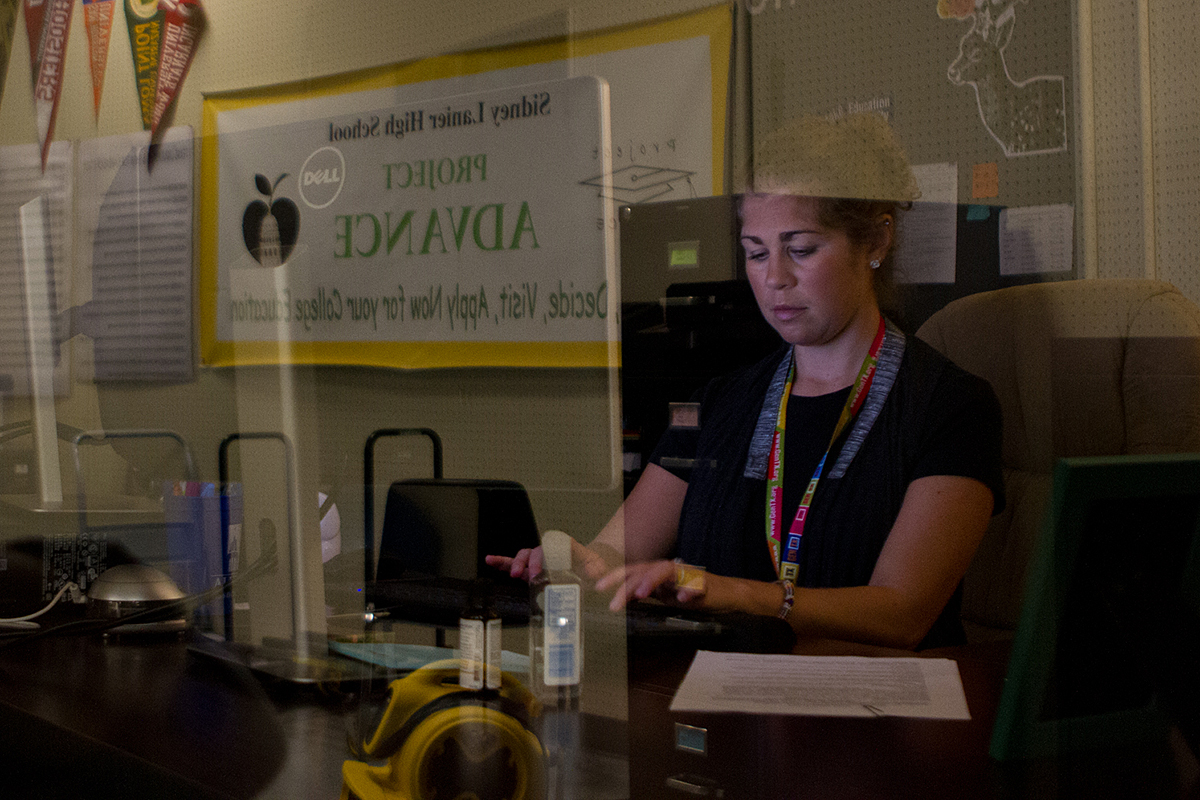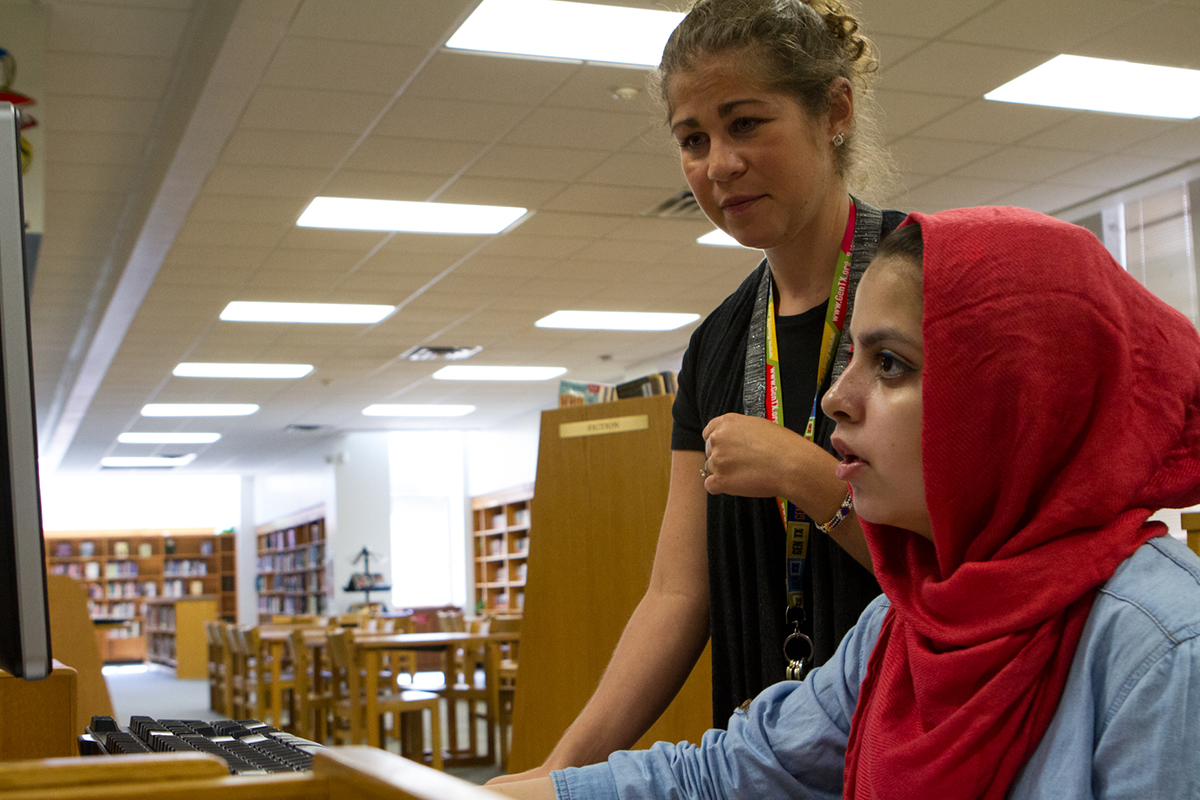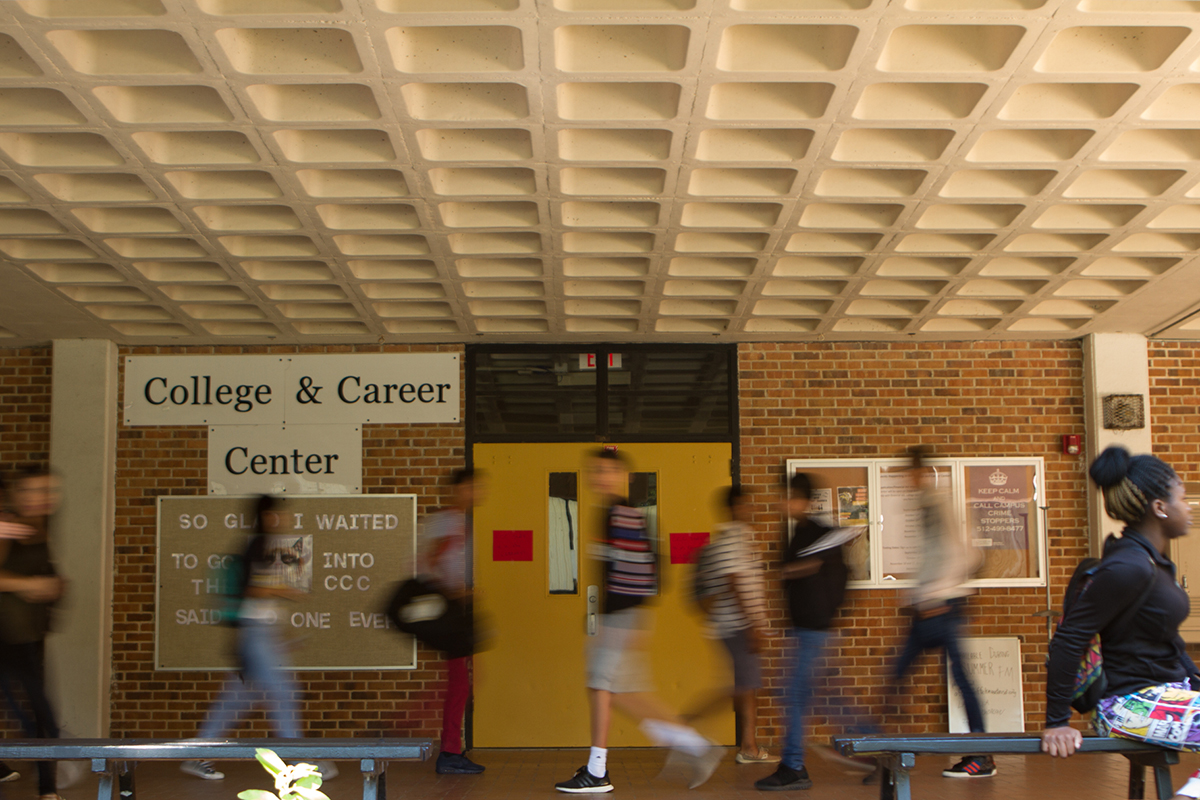High School Counselors Help Students Find a Path to College or Careers
By Lynda Gonzalez
Reporting Texas

College adviser Lauren Discher is working on her computer while awaiting students at Lanier High School in Austin. Christian Benavides/Reporting Texas
William Borroso, a 2016 graduate of Lanier High School in Austin, considered applying to a university, but at the guidance of his campus’ college advisers, he decided to attend a community college instead. He recalls them telling him, “‘If you don’t really know what you want to be, then you might as well go to Austin Community College, since it’s cheaper there.'”
Borroso and many other high school students making career decisions depend on college and career advising initiatives such as those Lanier offers. But even as the state pushes for college-readiness and career preparation for high school students, college and career advisers in the Austin Independent School District say they have to consider a range of socioeconomic factors when advising students.
What is suitable for graduates from Lanier, where the district classified 86.8 percent of enrolled students in 2016-2017 as economically disadvantaged, does not seem to meet the needs of graduates from Anderson High School, where only 22.8 percent of students fall into that category.
Anderson’s college adviser, Pamela Mason, said the majority of the school’s seniors applied to and attended four-year universities. The graduating class of 2015 had a 93 percent college-bound rate, she added. Only a small number of Anderson graduates go right from high school to workor pursue other opportunities.
“We want students to pursue a higher education, but we do understand that there are a few students that will take a gap year,” Mason said, referring to students who travel or enlist in a service program, such as Americorps.
However, the picture at Lanier is not as bright. According to college adviser Lauren Discher, Lanier students who apply to a four-year university through the center’s initiatives often opt out before graduation.
“I think the thing that stops them the most is financial aid,” she said. “I’ll have a lot of students get accepted, and then the second semester maybe they can’t go, and so they choose ACC due to financial issues.”
Lanier is diverse, Discher added. The student body includes refugees and undocumented immigrants and students who are either low income, first in their family to go to college or both. With that comes a wide set of needs that district goals do not take into consideration.

Lauren Discher is helping a student with work at Lanier High School in Austin. Christian Benavides/Reporting Texas
F0r first-generation students, such as senior Jada Stewart, the center provides an invaluable resource to navigate the college application process. Stewart’s mother, Karen Robinson, said she didn’t know where to begin helping her daughter apply to college before visiting the center.
“It’s important that we have the center at Lanier for all the parents who don’t have experience in college,” Robinson said. “I’m a single mother with two kids in a lot of extracurricular activities. I feel a lot less tense and more at ease knowing I have someone I can talk to about college for my kids at the school.”
According to college adviser Discher, there is a lot of district pressure to have a high participation in the Free Application for Federal Student Aid program, or FAFSA. Students fill out the FAFSA applicatin to receive federal grants or loans to pay for tuition and expenses.
School district leaders “want every high school to have all of its seniors do a FAFSA, and they want every high school senior to do a four-year college application,” Discher said. “Sometimes that can be a struggle because not all students want to do a four-year, and not all students qualify under FAFSA.”
Undocumented students, for example, are ineligible to apply for federal aid because they’re not citizens. Instead, Discher helps those students fill out the Texas Application for Financial State Aid (TAFSA), because it allows non-citizens classified as Texas residents to qualify for state grants or loans for university expenses.
“Lanier’s numbers are always going to be a little lower than some of the other schools that don’t have as big of a population”of non-citizens, Discher said.
This is the third academic year in which the state requires districts to fully implement the requirements of House Bill 5, which the Legislature passed in 2013, which includes mandating school counselors to promote post-secondary education to parents and students. It guarantees college advising and a push for promoting higher education in all high schools, even though schools with economically disadvantaged students find themselves considering other options.

Students walking by the College and Career Center between classes at Lanier High School. Christian Benavides/Reporting Texas
“Each campus college and career center follows additional requirements in conjunction with House Bill 18, a mandate from June 2015 supporting an emphasis on college and career advising for all middle and high school students,” said Craig Shapiro, AISD associate superintendent of high schools.
The bills do not set numerical targets for how many students should submit college applications or the FAFSA, but districts set their own specific goals for high schools.
“Schools have the flexibility to create programs and initiatives that best serve the needs of the campus and community,”Shapiro said.
The center at Lanier also offers career connections for students going into the the workforce after graduation. It pairs students with local electricianl unions and construction firms to begin working and making an income. Students interested in cosmetology receeve help with applications to the Aveda Institute or Paul Mitchell cosmetology schools.
“Not all of our students are going to be going to four-year colleges, but we want them to know that we are very supportive of their decisions and want to help them in any way that we can,” Discher said.